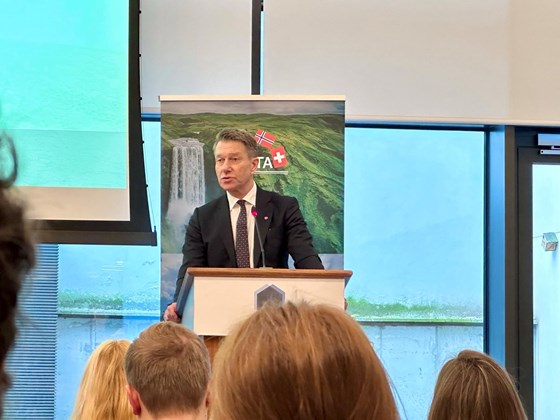CCS-seminar Brussel
Tale/innlegg | Dato: 30.01.2024 | Energidepartementet
Energiminister Terje Aasland holdt dette innlegget på et seminar om CCS i Brussel den 30.januar 2024.

Check against delivery.
Commissioner Simson, Ambassador Stefanson, Ladies and gentlemen.
Let us start with some numbers:
The Net-Zero Industry Act aims to establish storage capacity for Fifty million tonnes of CO2 by 2030 in the EU.
In Norway, we are in a position to match this number already in the early 2030s alone.
Equinor is leading the development of a CO2 pipeline from Belgium to Norway.
This pipeline is called the “CO2 highway”, and it could be in operation by 2030.
The pipeline alone could transport thirty million tonnes of CO2 annually.
This CO2 will be safely stored on the Norwegian continental shelf, and many companies are now applying for licenses for CO2 storage.
I have already awarded licenses to eleven different companies for storage capacity for forty million tonnes of CO2 per year.
This is very positive. I hope it means the start of a functioning CO2 market.
Today, we see that some are hesitant to invest in CO2 capture, due to the lack of storage. Others are hesitant to invest in storage capacity, due to the lack of demand. This is the classic “chicken and egg” dilemma.
I believe that the goal should be a liquid market with sufficient volumes of CO2, where decisions to invest in capture is dis-connected from decisions to invest in storage.
To get there, it is important that the right investment conditions are in place – and that we don’t over-regulate the market.
Norway can offer 27 years of experience with safe storage of CO2 under the seabed.
We have the world’s largest and most flexible test facility for CO2 capture technology, Technology Center Mongstad. It has been instrumental in improving capture technology. It has been in operation since 2012 with strong support from the government.
Not least, Longship, a full-scale carbon capture and storage project that will demonstrate the capture of CO2 from industrial sources, as well as transport and safe storage of CO2.
The first two commercial agreements have been officially signed, and we are in dialogue with relevant countries on matters related to import/export of CO2, for permanent storage on the Norwegian continental shelf.
Longship will demonstrate that CCS is possible and safe throughout the whole value chain.
And, as we are discussing here today: It will become a catalyst for further deployment of CCS both nationally and internationally.
I am glad to say we are on track for startup in early 2025.
However, being a first mover on CCS is a commitment and a responsibility.
In that regard, we need to have a perspective outside our borders.
For CCS to become an effective climate tool, and for Longship to truly succeed, we need and welcome more countries and companies to invest in and develop CCS solutions.
This is necessary for CCS to reach economies of scale and bring down costs.
There is indeed a momentum for CCS right now that moves the industry forward, and promising and rapid development in Europe.
We especially look forward to the European Commission’s Industrial carbon management strategy coming soon.
One important step was taken last year when Norway and the EU established a Green Alliance.
Under the Green Alliance, we will continue our excellent cooperation in some areas, and establish and strengthen cooperation in others.
Many energy policy areas under the EU are relevant for the green transition. The major policy response to the climate challenges and solution lays within the energy sector.
Carbon capture and storage is an important element in the alliance.
It will:
- Further develop carbon capture and storage technologies.
- Bring this key technology to markets and foster the decarbonisation of hard-to-abate industrial sector.
- And not least, further develop European market rules and infrastructure for CO2 capture, transport, utilisation, and storage.
In other words, the Green Alliance will exactly address the challenges lying ahead for CCS, to drive down costs and to develop a market and an infrastructure for CCS.
I truly believe these challenges are best solved together. The Green Alliance emphasises the strong relationship the EU and Norway enjoy as partners, allies, sharing fundamental values and a common regulatory framework through the EEA Agreement. I am very pleased to discuss these issues with our European partners here today.
Thank you!